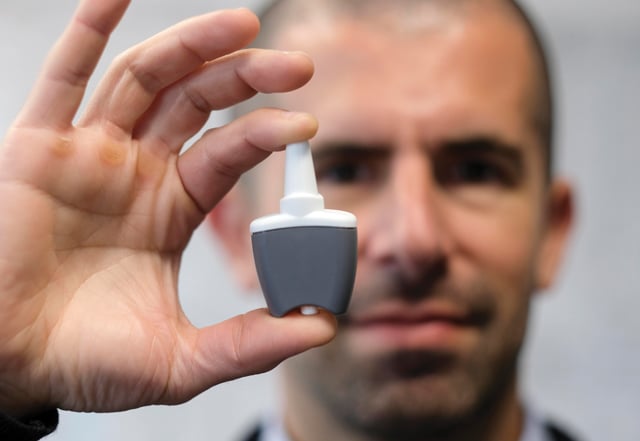
Roger Crystal saw a lot of emergency room patients die from heroin overdoses during his time working in a London hospital earlier in his career.
Injecting them with naloxone, a generic opioid blocker administered via syringe, was often too little too late, the U.K. native recalled.
That experience, however, led Crystal to help start Opiant Pharmaceuticals Inc., a Santa Monica biotechnology company known for developing the widely used nasal spray known as Narcan that anyone can use to quickly administer an overdose antidote.
“I said, ‘Let’s grab the bull by the horns and do this properly: Create a nasal spray that anyone can use,’” the 42-year-old Crystal said during an interview at his office overlooking the ocean. “If you’re the mother of a teenager with an opioid problem, you can store it in a closet — and you’ll know what to do,” he said.
Opiant’s name, he said, stands for opioid antagonist.
The publicly traded company, which expects to bring in $20 million in royalties this year from Narcan sales, has a growing collection of medicines to treat drug overdoses and alcohol abuse.
Within the next few years, Opiant Pharma aims to obtain federal approval for a nasal spray to counteract fentanyl, an opioid 50 times stronger than heroin, as well as another nasal spray designed to constrain heavy drinkers from imbibing beyond a couple of drinks.
And this year, Opiant is beginning clinical trials of an injectable drug to reverse the effects of overconsumption of synthetic or natural cannabinoids derived from marijuana. U.S. hospital ERs now treat more than a million such cases each year, according to the company, which said the number is expected to rise.
Facing an epidemic
Given the growing number of opioid-related deaths in the United States, Crystal estimates the potential market for opioid overdose reversal drugs is $1 billion.
“I think the value of our company is really in our pipeline — and with the potential to save lives,” said Crystal, chief executive of Opiant. “The (opioid) crisis has evolved, to get a lot worse,” he said, adding that the market needs access to stronger reverse agents.
Among biotech companies in Los Angeles County, Opiant Pharma may have a unique niche in targeting drug overdoses and addiction, said Dina Lozofsky, executive director of Biocom L.A., a local trade group.
“No company in L.A. County is taking such a direct approach,” Lozofsky said. “I’m very excited about what they’re doing.”
The pipeline from Opiant takes aim at an American death rate from drug overdoses that now ranks highest among wealthy nations, according to a USC study published last month.
More than 70,000 people in the U.S. died from drug overdoses in 2017, including 48,000 from opioids, a class of drugs that includes heroin, as well as synthetic compounds such as Oxycontin and fentanyl.
The USC study found that U.S. drug mortality is now 60 percent higher than in Finland and Sweden, the nations with the next highest overdose death rates.
“The United States is experiencing a drug overdose epidemic of unprecedented magnitude,” said study author Jessica Ho, assistant professor at the USC Leonard Davis School of Gerontology, in a statement.
Building a pipeline
Opiant Pharma was founded in Finland as Lightlake Therapeutics in 2009 to develop a nasal naloxone treatment for binge eating disorder. Crystal, who also holds an MBA from the London Business School, joined the company at its launch as founding scientist and chief executive.
At the time, naloxone was only available to be used by syringe injection, and Crystal, an ear, nose and throat specialist, sought to develop a nasal spray version. Opiant moved to the United States in 2014 to pursue its growing market.
Narcan was approved by the FDA in 2015 and went on sale the following year. Available in most pharmacies to just about anyone who asks for it, the drug is currently licensed to Gaithersburg, Md.-based Emergent BioSolutions Inc.
Narcan was earlier licensed to Adapt Pharma Operations Ltd., based in Dublin, for up to $55 million in milestone payments, plus up to double-digit royalties on net sales. Emergent acquired Adapt last year for $735 million on the potential for the global opioid overdose market.
This year, global sales of Narcan are expected to reach $220 million, Crystal said, with Opiant taking roughly $20 million in royalties.
Still in the process of developing its offerings and building a customer base, Opiant Pharma lost $11.6 million for the nine months ended Sept. 30, but royalties are growing. A 2018 year-end report is due out later this month.
The company has 17 employees, split between Santa Monica and the United Kingdom. Shares in OPNT have risen from a penny stock in 2009 to about $15.79 at market close March 7. The company’s market cap is roughly $60 million.
Opiant received $13.8 million in funding last year from health care institutional investors. It also took in $12 million in federal grants to develop a nasal spray to reverse overdose from fentanyl, in the event of a potential chemical attack using the opioid.
“Our overall approach is recognizing that these areas have huge needs with very few medical options available,” Crystal said. “It’ll take time. It’ll take investment. It’ll take companies like us, willing to take a risk.”
